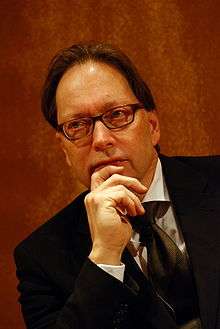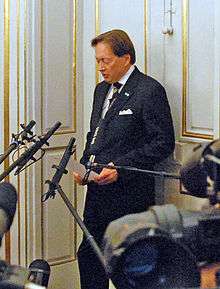Horace Engdahl
| Horace Engdahl | |
|---|---|
 Horace Engdahl in 2008 | |
| Born |
30 December 1948 Karlskrona, Sweden |
| Occupation | professor of Scandinavian literature University of Aarhus; former Permanent Secretary of the Swedish Academy |
| Spouse(s) | Ebba Witt-Brattström (1989–2014) |
Horace Oscar Axel Engdahl (born 30 December 1948) is a Swedish literary historian and critic, and has been a member of the Swedish Academy since 1997. He was the permanent secretary of the Swedish Academy, i.e. its spokesman, from 1999 to June 2009, when he was succeeded by Swedish author and historian Peter Englund.
Biography
Engdahl was born in Karlskrona, Blekinge, Sweden. He earned his B.A. in 1970 at Stockholm University;[1] he earned his doctoral degree (fil. dr.) in 1987, with a study on Swedish romanticism, but had meanwhile been active as a literary critic, translator and journal editor, and was one of the introducers of the continental tradition of literary scholarship in Sweden. He is adjunct professor of Scandinavian literature at the University of Aarhus in Denmark. He speaks Swedish, English, German, French and Russian fluently.
Engdahl was member of the Kris editorial staff.[2]
On 16 October 1997, Engdahl became a member of the Swedish Academy, elected to seat number 17 vacated by the death of Johannes Edfelt; on 1 June 1999, he succeeded Sture Allén as the Academy's permanent secretary, i.e. its executive member and spokesperson. As such, he had the annual task of announcing the recipient of the Nobel prize in literature to the public. On 20 December 2008 it was announced that after ten years Engdahl would step down as the Academy's permanent secretary on 1 June 2009.[3]
Between 1989 and 2014 he was married to Ebba Witt-Brattström, professor of literature at Södertörn University outside Stockholm. Together they have three sons.
Controversy
In October 2008, Engdahl told the Associated Press that the United States is "too isolated, too insular" to challenge Europe as "the center of the literary world"[4] and that "they don't translate enough and don't really participate in the big dialogue of literature ...That ignorance is restraining." At the time of the interview, no American author received a Nobel Prize in Literature since 1993.[5] His comments generated controversy across the Atlantic, with Harold Augenbraum, head of the U.S. National Book Foundation offering to send him a reading list.[4] Engdahl was reported "very surprised" that the American reaction was "so violent". He did not think that what he said was "that derogatory or sensational" and conceded his comments may have been "perhaps a bit too generalizing".[4]

Bibliography
- Om det utopiska tänkesättet : föreläsning i Stockholm (1982)
- Swedish ballet and dance : a contemporary view (1984)
- Den romantiska texten : en essä i nio avsnitt (1986)
- Om uppmärksamheten (1988)
- Stilen och lyckan : essäer om litteratur (1992)
- Beröringens ABC : en essä om rösten i litteraturen (1994)
- Stagnelius Kärleken (1996)
- Meteorer (1999)
- Ärret efter drömmen (2009)
- Cigaretten efteråt (2011)
- Den sista grisen (2016)
References
- ↑ http://www.svenskaakademien.se/web/Horace_Engdahl_1.aspx
- ↑ http://www.svenskaakademien.se/svenska-akademien/de-aderton/stol-nr-17-horace-engdahl
- ↑ Nilsson, Dan (2008-12-20). "Fattade beslutet i maj". Svenska Dagbladet. Retrieved 2008-12-20.
- 1 2 3 "No Nobel prizes for American writers: they're too parochial" by Suzanne Goldenberg, The Guardian, Thursday 2 October 2008
- ↑ "Lost in Translation? A Swede’s Snub of U.S. Lit"; New York Times, October 4, 2008, by Charles McGrath
External links
| Cultural offices | ||
|---|---|---|
| Preceded by Johannes Edfelt |
Swedish Academy, Seat No.17 1997- |
Incumbent |
| Wikimedia Commons has media related to Horace Engdahl. |